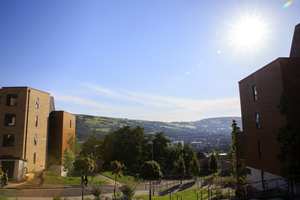
LLB (Hons) Legal Practice (SQE)
Law at USW is rated top in Wales for academic support, assessment and feedback National Student Survey 2023
The LLB (Hons) Legal Practice (SQE) degree is an exciting and unique degree by giving you the opportunity to engage in law in action from your first year, through to becoming a Student Advisor in our award-winning Legal Advice Clinic. It provides a fantastic opportunity for you to gain a law degree alongside preparation for the external SQE exam, to prepare you for qualification as a solicitor.
Employability as at the heart of everything we do. The Clinical Practice modules integrate our award-winning Legal Advice Clinic into the degree. Every student on the course will be exposed to real life clients and have the opportunity to provide them with legal assistance under the supervision of qualified solicitors. In the 2022-2023 academic year, students assisted over 80 clients alone.
As part of this course, you will be uniquely prepared to:
- Sit the SQE 1 exams;
- Develop the skills required for SQE 2;
- Carry out a range of tasks expected of junior lawyers and legal professionals; and
- Confidently build your professional networks with employers and external stakeholders.
You can use this authentic learning experience to gain some hours towards Qualifying Work Experience (QWE) and develop skills which can be used towards the 2 years of QWE required to become a solicitor.
The Legal Advice Clinic and University’s links to prominent law firms and employers in South Wales, will provide you with invaluable opportunities to build your professional networks. You will be able to do this alongside furthering access to justice and legal education for the wider community.
Outside of the classroom, you can become part of our thriving USW Student Law Society and get involved in a range of social and networking activities. The Society supports students with mooting in Year 1. You can also get involved in competitions such as mooting and client interviewing.
Available to study part-time or full-time, the programme covers the foundation of legal knowledge required by the Solicitors Regulations Authority for the purposes of professional qualification as a solicitor in England and Wales.
This course is also available through Network75, a combined work and study route.
Year 1
You will study:
- Academic and Professional Legal Skills
- Criminal Law
- Law and the State
- Legal Systems and Methods
- The Law of Contract
- The Law of Torts
Year 2
You will study:
- Land Law
- Criminal Law in Practice
- Dispute Resolution and Advocacy
- Foundations of Legal Practice
- Clinical Practice 1
Plus one optional module* from a range of specially designed units which develop your foundational studies:
- Law and Technology in Practice
- Law on Trial
- Public Legal Education
Year 3
You will study:
- Equity and the Law of Trusts
- Business Law in Practice
- Property Law in Practice
- Clinical Practice 2
Plus two optional modules* from:
- Child Protection and Youth Justice
- Employment Law in Practice
- Family Law in Practice
- Mergers and Acquisitions
- Private Client in Practice
- Law in the Community
*The optional modules listed are those that are most likely to be available, but they may be subject to change.
Teaching
The course is currently using a blended approach to teaching.
Teaching on the LLB (Hons) Law degree is informed by actual practice, and our modules reflect real-life trends. Teaching methods vary from traditional lectures to more clinical legal education and online simulations.
Law lecturers engage in a variety of research activities which result in the presentation of papers at conferences, the publication of journal articles and textbooks. All our areas of research feed directly into your studies, so you will benefit from a cutting-edge curriculum that is taught by staff who are at the forefront of their subject area.
In years two and three, you will put theory into practice at our Legal Advice Clinic. The Clinic is a free, face-to-face advice service open to staff, students and members of the public. Working under the supervision of qualified solicitors, you will provide legal advice on real-life problems.
We have a programme of high-profile guest speakers, whose talks will give you an insight into the practice of law and help you understand the many career paths available when you graduate.
Assessment
Assessment includes self and tutor assessment, written coursework, portfolios, individual and group presentations, and examinations.
Accreditations
The course maintains a focus on the law foundation subjects as recommended by the Solicitors Regulation Authority and the Bar Standards Board as satisfying the academic stage of training. In addition, the professional practice subjects, which complete the knowledge required to sit the SQE exam.
Facilities
The University of South Wales has impressive study facilities for law. The award-winning Legal Advice Clinic sits in the main Law building. We also have a courtroom with digital video facilities, a legal practice library, and dedicated teaching and practice rooms. You can take part in a range of activities, including moots and mock trials in our Moot Courtroom, which is modelled on those you will experience as a qualified practitioner. We run simulations in our Hydra Suite to provide real world experiences in a supportive environment.
Lecturers
Course Leader: Adam Collins
Tutors:
- Alexandra Dobson
- Andrew Baker
- Benjamin Jones
- Brian Dowrick
- Clare Lewis
- Hannah Coburn
- Hannah Menard
- Hayley Brain
- Holly Evans
- Karen Counsell
- Rachel Lewis
- Rob Wilks
- Tayiba Hussain
Support
Induction
There will be a full induction to the LLB (Hons) Legal Practice (SQE) in the week before teaching starts, enabling students to adjust to university life, get to know the teaching team, meet their Personal Academic Tutor and their peers, plan their studies, and understand how the University works.
Staff support
The course leader is available in regular weekly office hours.
Each member of the course teaching team will have at least one scheduled office hour per teaching week. These office hours will be drop-in sessions, for which students will not need to book.
There are a variety of University departments that offer support to students.
Peer support
We have Peer Assisted Study Support (PASS) sessions to support Year 1 students. These PASS sessions are run by students in the second and third year. These sessions enhance the law community and allows students to be partners in the course.
We regularly revalidate courses for quality assurance and enhancement
At USW, we regularly review our courses in response to changing patterns of employment and skills demand to ensure we offer learning designed to reflect today’s student needs and tomorrow’s employer demands.
If during a review process course content is significantly changed, we’ll write to inform you and talk you through the changes for the coming year. But whatever the outcome, we aim to equip our students with the skillset and the mindset to succeed whatever tomorrow may bring. Your future, future-proofed.
Typical A-Level Offer
BCC (this is equivalent to 104 UCAS tariff points)
Typical Welsh BACC Offer
Pass the Advanced Welsh Baccalaureate Diploma with Grade C in the Skills Challenge Certificate and BC at A Level (this is equivalent to 104 UCAS tariff points).
Typical BTEC Offer
BTEC Extended Diploma Distinction Merit Merit (this is equivalent to 112 UCAS tariff points).
Typical Access to HE Offer
Pass the Access to HE Diploma and obtain a minimum of 104 UCAS tariff points
Additional Requirements
Contextual offers
We may make you a lower offer based on a range of factors, including your background (where you live and the school or college that you attended for example), your experiences and individual circumstances (as a care leaver, for example). This is referred to as a contextual offer and we receive data from UCAS to support us in making these decisions. USW prides itself on its student experience and we support our students to achieve their goals and become a successful graduate. This approach helps us to support students who have the potential to succeed and who may have faced barriers that make it more difficult to access university. Here is a link to our Contextual Admissions Policy.
Other qualifications and experience
We can also consider combinations of qualifications and other qualifications not listed here may also be acceptable. We can sometimes consider credits achieved at other universities and your work/life experience through an assessment of prior learning. This may be for year one entry, or advanced entry to year two or three of a course where this is possible.
To find out which qualifications have tariff points, please refer to the UCAS tariff calculator.
If you need more help or information or would like to speak to our friendly admissions team, please contact us here
Please note that whilst this course does not require a DBS Check for entry, some professions will not consider candidates who have certain types of criminal convictions. Therefore, if you have a criminal conviction and you are considering a particular career path we would recommend that you check with the relevant professional body or refer to their recruitment policy to make sure that your conviction will not disadvantage you.
International Entry Requirements
We also welcome international applications with equivalent qualifications. Please visit the country specific pages on our international website for exact details.
English Requirements:
In general, international applicants will need to have achieved an overall IELTS grade of 6.0 with a minimum score of 5.5 in each component.
However, if you have previously studied through the medium of English IELTS might not be required, but please visit the country specific page on our international website for exact details. If your country is not featured please contact us.
Full-time fees are per year. Part-time fees are per 20 credits. Once enrolled, the fee will remain at the same rate throughout the duration of your study on this course.
August 2024 - July 2025 Fees
Full-time UK: £9000
Full-time International: £14950
Part-time UK: £740 per 20 credits
August 2025 - July 2026 Fees
Full-time UK: TBC
Full-time International: TBC
Part-time UK: TBC
Student Perks
At the University of South Wales, you’re investing in so much more than a degree. We strive to provide our students with the best possible experience, no matter what you chose to study. Whether it’s access to top of the range mac books and PCs, state-of-the-art facilities packed with industry-leading equipment and software, masterclasses and events led by industry experts, or a wide range of clubs and societies to meet likeminded people, better tomorrows start with extra perks.
Each course also has their own unique student benefits to prepare you for the real word, and details of these can be found on our course pages. From global field trips, integrated work experience and free course-related resources, to funded initiatives, projects working with real employers, and opportunities for extra qualifications and accreditations - at USW your future, is future-proofed.
Click here to learn more about student perks at USW.
Additional Costs
As a student of USW, you’ll have access to lots of free resources to support your study and learning, such as textbooks, publications, online journals, laptops, and plenty of remote-access resources. Whilst in most cases these resources are more than sufficient in supporting you with completing your course, additional costs, both obligatory and optional, may be required or requested for the likes of travel, memberships, experience days, stationery, printing, or equipment.
* Obligatory
| Item | Cost | |
|---|---|---|
| Printing & Exhibition Costs: | £200 - £300 | Students need to pay for any printing they may need. |
Funding
Funding to help pay for (or cover) course tuition fees and living costs
Whilst you’re studying, you’ll have two main financial obligations – tuition fees and living costs. There’s lots of financial help available from the University of South Wales and external funding sources, that may provide loans (which have to be paid back) and grants, scholarships and bursaries (that don't).
To learn about course fees, funding options, and to see if you are eligible for financial support, visit our Fees and Funding pages.
UK students
Apply via UCAS if you are a UK residing applicant, applying for year one of a full-time undergraduate degree, Foundation Year, Foundation Degree or HND and you have not applied through UCAS before. If you are applying to study part-time, to top up your Foundation Degree or HND, or to transfer to USW from another institution, please apply directly.
International and EU students
Apply directly to the University if you live outside the UK.
You will be taught the Clinical Practice modules via the Legal Advice Clinic. Under supervision of qualified solicitors and lecturers, you will provide free legal advice to clients. This will give you an opportunity to put law into practice and to contribute working hours towards the 2 years of Qualifying Work Experience required to become a solicitor. The Legal Advice Clinic will also allow you to develop and put into practice vital skills, such as interviewing and advising clients, which are assessed at SQE2.
The Clinic also provides you with the opportunity to play a part in ensuring access to justice in the local community via a variety of outreach programmes.
Graduates of the LLB (Hons) Legal Practice (SQE) programme will typically go on to become solicitors or barristers.
The LLB (Hons) Legal Practice (SQE) will prepare students to sit the SQE examination. Graduates who wish to join the Bar will be able to progress to a Bar Training Course.
A law degree is the most adaptable of academic qualifications. Law graduates have an excellent record of employability because they are educated to think logically, articulate arguments clearly and concisely, and how to use evidence and rules.
Graduates also progress into a variety of careers which range from Legal Technologists, Social Work, Police, Third Sector organisations, Business, Finance, HR, Local Government, Civil Service, Management, and Education to name a few possibilities.
What kind of student would this course suit?
- Aspiring solicitor or barrister.
- If you enjoy analysing issues and problem-solving. These transferrable skills will give you an excellent position in the graduate market.
- If you are interested in both the theoretical study and practical application of the law.



